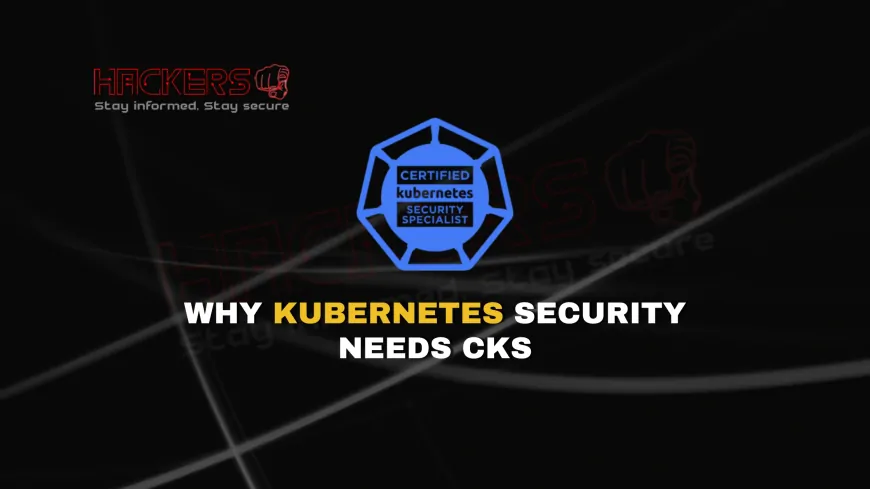Why Security Matters in Kubernetes |The Role of the CKS Certification
Picture this: you're running a bustling online store, and suddenly, a hacker slips through a tiny crack in your system, stealing customer data and bringing everything to a halt. In the world of cloud computing, where applications are built and scaled at lightning speed, such nightmares are all too real. Kubernetes, the powerhouse tool for managing containerized apps, has revolutionized how we deploy software. But with its complexity comes vulnerability. As we step into 2025, cyber threats are evolving faster than ever, making security not just an add-on but a core necessity. That's where the Certified Kubernetes Security Specialist (CKS) certification shines—it equips professionals with the skills to fortify these environments against attacks. In this blog, we'll dive into why security is crucial in Kubernetes, explore common pitfalls, and see how CKS plays a pivotal role in building safer systems. Whether you're a newbie dipping your toes into cloud tech or a seasoned pro looking to level up, this guide will break it down simply and clearly, helping you understand the big picture without getting lost in jargon.

Table of Contents
- What is Kubernetes?
- The Growing Importance of Security in Kubernetes
- Common Security Threats in Kubernetes Environments
- Best Practices for Kubernetes Security
- Introducing the Certified Kubernetes Security Specialist (CKS)
- Prerequisites for CKS
- Exam Details and Format
- Detailed Curriculum Overview
- How CKS Prepares You for Real-World Security Challenges
- Preparation Strategies and Resources
- Benefits of Obtaining CKS Certification
- Career Opportunities in Kubernetes Security
- Conclusion
- FAQs
What is Kubernetes?
Kubernetes, or K8s for short, is like the conductor of a symphony orchestra for software applications. It's an open-source platform that automates the deployment, scaling, and management of containerized applications. Containers are essentially lightweight boxes that package up code and all its dependencies, so the app runs reliably no matter where it's deployed—be it on your local machine or a vast cloud network.
Why has Kubernetes become so popular? In 2025, businesses are all about agility. Kubernetes allows teams to roll out updates quickly, handle traffic spikes automatically, and recover from failures without downtime. Companies like Netflix and Spotify use it to stream content seamlessly to millions. But here's the catch: as clusters (groups of servers running Kubernetes) grow, they become prime targets for cybercriminals. Without proper safeguards, what starts as a efficient system can turn into a security headache. Understanding Kubernetes basics is the first step toward appreciating why security isn't optional—it's essential for keeping your digital operations running smoothly and safely.
The Growing Importance of Security in Kubernetes
In 2025, the cloud-native landscape is booming, but so are the risks. According to recent reports, new Kubernetes clusters are targeted by attackers within minutes of going online. Critical vulnerabilities might be on the decline thanks to better tools, but adoption of built-in security features still lags behind. Why does this matter? A single breach can cost millions in lost revenue, legal fees, and damaged trust.
Security in Kubernetes isn't just about locking doors; it's about building a fortress. With runtime visibility becoming a top priority, organizations need to monitor activities in real-time to catch threats early. DevSecOps practices—integrating security into development from the start—are now must-haves. Trends like zero-trust models, where nothing is trusted by default, and AI-driven threat detection are reshaping how we protect these environments. Simply put, ignoring security means inviting chaos. Strong measures ensure compliance with regulations, protect sensitive data, and maintain business continuity in an era where cyber attacks are increasingly sophisticated.
Common Security Threats in Kubernetes Environments
Kubernetes is powerful, but its complexity opens doors to various threats. One major issue is misconfigurations—think of it as leaving your front door unlocked. Attackers exploit weak settings in components like the API server or etcd (the database storing cluster data).
Supply chain attacks are another big concern. Malicious code can sneak in through unverified container images, leading to widespread compromise. Unauthorized access via poor role-based controls allows insiders or hackers to escalate privileges and wreak havoc.
Runtime threats, like container escapes, where an attacker breaks out of a container to access the host system, are rising. Network vulnerabilities let bad actors move laterally within the cluster, stealing data or launching denial-of-service attacks. In 2025, with AI and ML integration, threats are smarter, making proactive detection crucial. Understanding these risks is key to mitigating them before they cause real damage.
Best Practices for Kubernetes Security
Securing Kubernetes doesn't have to be overwhelming. Start with the basics: implement Role-Based Access Control (RBAC) to ensure users only have the permissions they need. Use network policies to control traffic between pods, acting like firewalls inside your cluster.
Scan container images for vulnerabilities before deployment—tools like Trivy can help spot issues early. Manage secrets (like passwords) securely with Kubernetes Secrets or external vaults. Enable audit logging to track activities and detect anomalies.
Adopt a zero-trust approach: verify everything. Regularly update components and use pod security standards to restrict risky behaviors. Runtime security tools like Falco monitor for suspicious activity. By following these practices, you can significantly reduce risks and build a more resilient environment.
Introducing the Certified Kubernetes Security Specialist (CKS)
The CKS certification is your ticket to mastering Kubernetes security. Offered by the Cloud Native Computing Foundation (CNCF) and the Linux Foundation, it validates your ability to secure container-based apps and platforms throughout their lifecycle. Launched to address the growing need for specialized skills, CKS focuses on best practices for build, deployment, and runtime security.
In a vendor-neutral way, it teaches how to implement defenses against real threats. For professionals, it's a way to demonstrate expertise; for businesses, it means having teams that can optimize and protect clusters effectively. As Kubernetes adoption surges, CKS holders are in high demand to tackle the security challenges head-on.
Prerequisites for CKS
To pursue CKS, you first need the Certified Kubernetes Administrator (CKA) certification. This ensures you have a strong grasp of cluster management before diving into security specifics. No other formal requirements exist, but hands-on experience with Kubernetes is vital—think deploying apps, troubleshooting, and basic networking.
If you're starting fresh, begin with Kubernetes fundamentals. Once CKA-certified, you're ready for CKS. Keep your CKA current, as it must be valid when you take the exam. This progression builds a solid foundation, making security concepts easier to apply.
Exam Details and Format
The CKS exam is practical and rigorous, testing your skills in a simulated environment. It's online, proctored, and lasts 2 hours with 15-20 tasks. You'll use command-line tools to secure a Kubernetes cluster, based on the latest version (like v1.33 in 2025).
Cost is around $445, including a retake. Passing requires 67%. It's valid for 2 years, renewable via exam or education. Allowed resources include official docs, but no cheating—proctors monitor everything. This format ensures you can handle real scenarios, not just theory.
Detailed Curriculum Overview
The CKS curriculum covers six domains, emphasizing comprehensive security. Here's a table outlining them, with weights and key subtopics based on the latest standards.
| Domain | Weight | Key Subtopics |
|---|---|---|
| Cluster Setup | 15% |
|
| Cluster Hardening | 15% |
|
| System Hardening | 10% |
|
| Minimize Microservice Vulnerabilities | 20% |
|
| Supply Chain Security | 20% |
|
| Monitoring, Logging, and Runtime Security | 20% |
|
This structure aligns with 2025 trends, incorporating AI and runtime focus for robust protection.
How CKS Prepares You for Real-World Security Challenges
CKS isn't just a badge—it's practical training for everyday threats. By tackling tasks like vulnerability scanning and RBAC setup, you learn to prevent common attacks. It emphasizes DevSecOps, helping integrate security into workflows.
In scenarios like supply chain breaches, CKS teaches image signing and SBOM usage. Runtime modules prepare you for anomaly detection with tools like Falco. Graduates can confidently handle compliance and incident response, making clusters resilient in production environments.
Preparation Strategies and Resources
Prep for CKS by setting up a lab with Minikube. Focus on domains by weight—spend time on 20% areas like supply chain.
Resources include official docs, Linux Foundation courses (LFS260), and simulators like Killer.sh. Books on Kubernetes security and blogs from Wiz or Mend.io offer insights. Join communities on Reddit or Slack. Practice daily for 2-3 months to build confidence.
Benefits of Obtaining CKS Certification
CKS boosts your career with proven expertise. It leads to higher pay—often 15-25% more—and job security in cloud roles. Personally, it builds skills for complex challenges, enhancing problem-solving.
For teams, CKS ensures better practices, reducing breaches. It's recognized globally, opening doors to networks and advanced certs. In 2025, with security paramount, CKS is a smart investment.
Career Opportunities in Kubernetes Security
With CKS, roles like Security Engineer or DevSecOps Specialist await. You'll design secure clusters for tech giants or consult on compliance.
Demand is high in finance, healthcare, and e-commerce, where data protection is key. Job growth for cloud security pros is projected at 30%+. Pair CKS with experience for senior positions, leading teams in innovative environments.
Conclusion
Security in Kubernetes is vital in 2025, guarding against evolving threats while enabling innovation. We've explored Kubernetes basics, why security matters, common threats, best practices, and the pivotal role of CKS—from prerequisites and curriculum to preparation and benefits. CKS empowers you to secure systems effectively, boosting careers and organizational resilience. Don't wait for a breach; invest in knowledge today. Whether starting out or advancing, embracing security through CKS ensures a safer digital future.
FAQs
Why is security important in Kubernetes?
Security protects against breaches, ensures compliance, and maintains system integrity in complex, dynamic environments.
What are the main threats to Kubernetes clusters?
Common threats include misconfigurations, supply chain attacks, unauthorized access, and runtime vulnerabilities.
How does zero-trust apply to Kubernetes?
Zero-trust verifies all access, using RBAC and network policies to minimize risks.
What is the role of CKS in security?
CKS certifies skills in securing Kubernetes throughout the lifecycle, promoting best practices.
Do I need CKA for CKS?
Yes, a valid CKA is required as a prerequisite.
How long does CKS certification last?
It lasts 2 years, renewable by retake or education.
What is the passing score for CKS?
You need at least 67% to pass.
Can beginners pursue CKS?
Beginners should start with basics and CKA first.
What tools are useful for Kubernetes security?
Tools like Trivy for scanning, Falco for runtime, and Kube-bench for benchmarks.
How does CKS help in DevSecOps?
It integrates security into development, fostering proactive practices.
What is RBAC in Kubernetes?
Role-Based Access Control assigns permissions to users or services, reducing exposure.
Why scan container images?
To detect vulnerabilities before deployment, preventing supply chain attacks.
What is runtime security?
Monitoring and protecting applications while running, detecting anomalies.
How to prepare for CKS exam?
Practice in labs, use official resources, and simulators like Killer.sh.
Is CKS worth the investment?
Yes, it enhances career prospects and expertise in high-demand security.
What career paths does CKS open?
Roles like security engineer, DevSecOps specialist, and cloud architect.
How has Kubernetes security evolved in 2025?
Focus on AI, runtime visibility, and declining vulnerabilities but better adoption needed.
What are network policies?
Rules controlling traffic between pods, enhancing isolation.
Why use audit logs in Kubernetes?
To track events and investigate incidents effectively.
Where can I find more on CKS?
Visit the Linux Foundation or CNCF websites for details.
What's Your Reaction?










































































